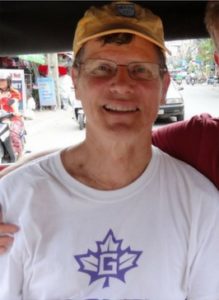 David Janzen completed a career of social work and human resources in 2011 and is living at a retirement community in Goshen, Indiana. He and his wife were among the founding members of Fellowship of Hope Mennonite Church and intentional community in Elkhart, Indiana. Dave has three sons and a daughter-in-law living nearby. His wife resides comfortably in a healthcare setting, and two of their sons live in group homes. David’s post originally appeared on Opening Doors, Anabaptist Disabilities Network blog.
David Janzen completed a career of social work and human resources in 2011 and is living at a retirement community in Goshen, Indiana. He and his wife were among the founding members of Fellowship of Hope Mennonite Church and intentional community in Elkhart, Indiana. Dave has three sons and a daughter-in-law living nearby. His wife resides comfortably in a healthcare setting, and two of their sons live in group homes. David’s post originally appeared on Opening Doors, Anabaptist Disabilities Network blog.
Since advent means the approach of something important, it stirs our imagination to hope for a better life for our families, our communities, our world. Ancient Israel looked for signs that a Messiah would remove the yoke of oppression and usher in an age of justice and mercy. The songs credited to Hannah (I Sam. 2) and Mary (Luke 1) are powerful expressions of hope in times of uncertain future for their people. Living centuries later, we celebrate the coming of Jesus and his message of salvation in our own perilous time.
How do those of us living with the challenge of a disabled family member, or even our own limitations, experience the advent hope?
What kind of hope do we hold on to when each day presents the same struggle? How do I answer the usual question, “How’s your wife?,” when Alzheimer’s is slowly robbing her of physical and mental ability? Or what can I offer my son with an intellectual disability when he asks if I will dance at his wedding, his great hope which seems so far and unlikely to be fulfilled?
Maybe my family’s situation isn’t so different from that faced by Hannah and Mary. What chance was there that a small people like Israel would become secure against overpowering forces in their world? We may see evidence that the powerful are knocked off their thrones, but where do the refugees and other poor find homes and food security?
The coming of Jesus brought us a shining beacon announcing a new kingdom (kin-dom if you prefer) where love extends to all — poor and rich, able and disabled, young and old, documented and undocumented — regardless of race, gender and nationality. He suffered rejection and physical pain to lead us toward becoming a community of caring, wounded people where love reigns.
Our pain is also real, yet we can continue the journey knowing Jesus and our fellow travelers are with us. A network of family, friends, church brothers and sisters, support group members and facility staff help us realize God’s presence as we face each day.
Zechariah’s hymn in Luke 1 has become a favorite benediction to meetings in my church and I think sums up the meaning of Advent:
“By the tender mercy of our God, the dawn from on high will break upon us, to give light to those who sit in darkness and in the shadow of death, to guide our feet into the way of peace.”

